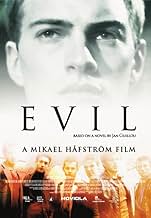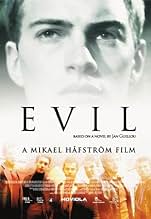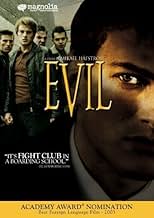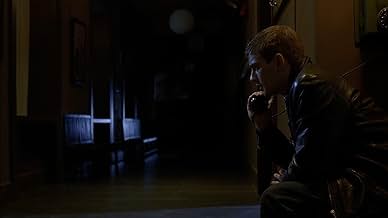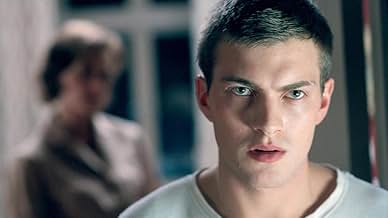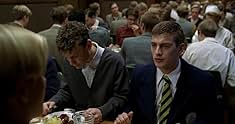VALUTAZIONE IMDb
7,7/10
43.651
LA TUA VALUTAZIONE
Espulso da diverse scuole pubbliche per comportamenti violenti, Erik arriva in un collegio privato deciso a cambiare vita. Si scontra con un feroce nonnismo, ma non si arrende.Espulso da diverse scuole pubbliche per comportamenti violenti, Erik arriva in un collegio privato deciso a cambiare vita. Si scontra con un feroce nonnismo, ma non si arrende.Espulso da diverse scuole pubbliche per comportamenti violenti, Erik arriva in un collegio privato deciso a cambiare vita. Si scontra con un feroce nonnismo, ma non si arrende.
- Regia
- Sceneggiatura
- Star
- Candidato a 1 Oscar
- 9 vittorie e 10 candidature totali
Recensioni in evidenza
Swedish "Ondskan" competed against a strong field in the Foreign Language Film category in last year's Oscar which was won deservedly by Canada's "Les Invasions Barbares". While my personal favorite is "Tasogare Seibei", Ondskan is a worthwhile contender.
The scene is familiar, boarding school bullying, upper class domination and violence. The message however is broader and more general. Ghandi has been mentioned a couple of times in the movie, which reminds me as well of the "enduring" heroes in the westerns in the fifties who adhere steadfastly to their principle, refusing to be provoked into violence (the best example is The Big Country). The motivation of the "hero" in Ondskan is however a little less lofty, as I'm going to explain.
Thanks to his dominating and sadistic step-father, Erik (Andreas Wilson) is well-equipped to endure violence and abuse when he is sent to a prestigious boarding school after causing a lot of problems at his local high school. While a veteran perpetrator of violence himself, Erik is effectively constrained as if by a spell cast by the boarding school: anyone fighting with a member of the student council will be expelled.
Most of the movie surrounds the senior students' tyrannizing over the juniors, and it gets a bit too long. There's no point in elaborating other than saying that the violence is not particularly graphic (accepting that some may disagree) and if you're going to throw up in the cinema, it's most likely due to some other revolting scenes, the details of which I'll spare. Although Erik's motivation in enduring the abuses and violence is essentially self-preservation (from expulsion), he does earn the audience admiration, which makes the poetic justice at the end rather sweet.
A great part of the movie's success owes to Wilson's excellent performance. Although most of the audience start with thinking that Erik is the "evil" character, they would soon turn completely around and empathize with him, and eventually love him. Also excellent is Henrik Lundstrom, playing Erik's meek, plump roommate who is victimizes as he becomes the villains' tool to break tough Erik. In addition to this affecting friendship, there are two other sub-plots which enrich the movie without detracting from the main theme. One is Erik's romance with a maid at the school. The other is his success with the school's swimming team.
Finally, one interesting point is that Erik's way out, his "court of final appeal", turns out to be indeed the legal route. While this makes it a little bit of a fairy tale ending, there is something to ponder over. There may really be numerous pockets of quasi jurisdictions such as the boarding school that really need to be straighten out by the real legal system. That point I'll leave to the legal experts.
The scene is familiar, boarding school bullying, upper class domination and violence. The message however is broader and more general. Ghandi has been mentioned a couple of times in the movie, which reminds me as well of the "enduring" heroes in the westerns in the fifties who adhere steadfastly to their principle, refusing to be provoked into violence (the best example is The Big Country). The motivation of the "hero" in Ondskan is however a little less lofty, as I'm going to explain.
Thanks to his dominating and sadistic step-father, Erik (Andreas Wilson) is well-equipped to endure violence and abuse when he is sent to a prestigious boarding school after causing a lot of problems at his local high school. While a veteran perpetrator of violence himself, Erik is effectively constrained as if by a spell cast by the boarding school: anyone fighting with a member of the student council will be expelled.
Most of the movie surrounds the senior students' tyrannizing over the juniors, and it gets a bit too long. There's no point in elaborating other than saying that the violence is not particularly graphic (accepting that some may disagree) and if you're going to throw up in the cinema, it's most likely due to some other revolting scenes, the details of which I'll spare. Although Erik's motivation in enduring the abuses and violence is essentially self-preservation (from expulsion), he does earn the audience admiration, which makes the poetic justice at the end rather sweet.
A great part of the movie's success owes to Wilson's excellent performance. Although most of the audience start with thinking that Erik is the "evil" character, they would soon turn completely around and empathize with him, and eventually love him. Also excellent is Henrik Lundstrom, playing Erik's meek, plump roommate who is victimizes as he becomes the villains' tool to break tough Erik. In addition to this affecting friendship, there are two other sub-plots which enrich the movie without detracting from the main theme. One is Erik's romance with a maid at the school. The other is his success with the school's swimming team.
Finally, one interesting point is that Erik's way out, his "court of final appeal", turns out to be indeed the legal route. While this makes it a little bit of a fairy tale ending, there is something to ponder over. There may really be numerous pockets of quasi jurisdictions such as the boarding school that really need to be straighten out by the real legal system. That point I'll leave to the legal experts.
I have lately been trawling through Swedish movies, in an effort to watch as many as I can. I have not yet come across one that I didn't at least appreciate. The Scandinavians are remarkable story-tellers, and can teach the rest of the world a thing or two about good story-telling in film. What surprises me the most is why it is the rest of the world does not know about and applaud this film. As an examination of bullying and abuse it is extraordinary.
"Ondskan" is the story of one teenage boy's experiences of bullying - both as a perpetrator and also from the receiving end - firstly at the hands of his bitter & twisted stepfather, then in the school-yard at his high school, and lastly at an exclusive boarding school to which he is sent by his mother. It is a highly charged movie, and will be too much for some more sensitive viewers, but tells a very important story of how it is bullying is perpetrated, justified, institutionalised, and then passed on so that the behaviour continues.
There is little to place this story in an historical context other than the music and the rather odd dress of the late 1950's. The culture of the school to which Erik Ponti is sent is one in which the members of the Council - the Boss Boys - ritually bully the younger boys, and the school staff turn a blind eye. To fight back by striking a Council member is to invite expulsion, and Erik cannot risk this. Andreas Wilson has a strong presence, and is believable as Erik, and Henrik Lundstrom, who plays the sensitive Pierre, is worthy of mention also. I came across this movie because I was searching for movies featuring Gustaf Skarsgard. In "Ondskan" Skarsgard plays the student we all want to hate - the top bully - and he does it well. Later in the movie we are given a brief insight into what drives him, and the degree of pain he experiences on a daily basis. Great writing!!
The only real gripe I had while watching this film was the swimming style of Erik's character. He was meant to be a top swimmer, and yet while doing freestyle his arms barely managed to get out of the water. With a swimming stroke like that he'd never make it to be top swimmer at any school. Picky, I know, but it bothered me.
If I could give this film 12 stars I would.
"Ondskan" is the story of one teenage boy's experiences of bullying - both as a perpetrator and also from the receiving end - firstly at the hands of his bitter & twisted stepfather, then in the school-yard at his high school, and lastly at an exclusive boarding school to which he is sent by his mother. It is a highly charged movie, and will be too much for some more sensitive viewers, but tells a very important story of how it is bullying is perpetrated, justified, institutionalised, and then passed on so that the behaviour continues.
There is little to place this story in an historical context other than the music and the rather odd dress of the late 1950's. The culture of the school to which Erik Ponti is sent is one in which the members of the Council - the Boss Boys - ritually bully the younger boys, and the school staff turn a blind eye. To fight back by striking a Council member is to invite expulsion, and Erik cannot risk this. Andreas Wilson has a strong presence, and is believable as Erik, and Henrik Lundstrom, who plays the sensitive Pierre, is worthy of mention also. I came across this movie because I was searching for movies featuring Gustaf Skarsgard. In "Ondskan" Skarsgard plays the student we all want to hate - the top bully - and he does it well. Later in the movie we are given a brief insight into what drives him, and the degree of pain he experiences on a daily basis. Great writing!!
The only real gripe I had while watching this film was the swimming style of Erik's character. He was meant to be a top swimmer, and yet while doing freestyle his arms barely managed to get out of the water. With a swimming stroke like that he'd never make it to be top swimmer at any school. Picky, I know, but it bothered me.
If I could give this film 12 stars I would.
In Sweden, Erik Ponti (Andreas Wilson) is the son of a remiss mother, and his stepfather gives sadistic beatings on him, using the most futile pretexts, without any interference of his mother. His dysfunctional family makes him a very violent teenager, culminating with his expulsion from the public school system in Sweden, due to a fight and aggression against another pupil. His mother sells some belongings of her and sends him to the elitist private school of Stjärnberg, as his last chance to complete his basic education. However, behind the name of the expensive and conservative school, there is a code of (dis)honor among the students, where the younger and those who belong to the lower social classes are humiliated by the veterans and those who belong to the high social classes without any questioning of the director. Erik feels like in hell while studying in Stjärnberg.
"Evil" is a stunning movie, which shows the danger of the power in wrong hands. Indeed, it is a psychological study of violence, which leads to cruelty. It explains the social behavior of, for example, street children in Brazil, who are sent very young to state reformatories and become cruel criminals when adults. The story is very engaging and the performance of the cast is outstanding, highlighting Andreas Wilson and his greatest opponent, the sadistic Otto Silverhielm (Gustaf Skarsgard). This movie shakes the viewers and in the end, we are cheering to Erik's revenge, wishing him to kill his aggressors, in a total inversion of the moral values. The DVD released by the Brazilian distributor VF Vídeo Filmes shows also a total lack of respect with the Brazilian consumers: in the Extras, there is an interview in Swedish with the director Mikael Häfström and the making-of, both without sub-titles, as if Brazilian people could understand this language. My vote is nine.
Title (Brazil): "Evil Raízes do Mal" ("Evil Roots of Evil")
"Evil" is a stunning movie, which shows the danger of the power in wrong hands. Indeed, it is a psychological study of violence, which leads to cruelty. It explains the social behavior of, for example, street children in Brazil, who are sent very young to state reformatories and become cruel criminals when adults. The story is very engaging and the performance of the cast is outstanding, highlighting Andreas Wilson and his greatest opponent, the sadistic Otto Silverhielm (Gustaf Skarsgard). This movie shakes the viewers and in the end, we are cheering to Erik's revenge, wishing him to kill his aggressors, in a total inversion of the moral values. The DVD released by the Brazilian distributor VF Vídeo Filmes shows also a total lack of respect with the Brazilian consumers: in the Extras, there is an interview in Swedish with the director Mikael Häfström and the making-of, both without sub-titles, as if Brazilian people could understand this language. My vote is nine.
Title (Brazil): "Evil Raízes do Mal" ("Evil Roots of Evil")
Erik Ponti(Andreas Wilson) is a young trouble maker who is constantly abused by his stepfather and often ignored by his mother. After a fight in his school, Eric gets enrolled in a boarding school by his mother. At the new school, Erik only makes one good friend Pierre(Henrik Lundström) but their lives slowly start falling apart when the older boys from the school make a pact to make Erik's life a living hell. This was a very gripping and disturbing movie. I saw this at the Vancouver Film Festival and enjoyed it quite a lot. Andreas Wilson is a gorgeous and talented young man and I hope he becomes big someday. I would give Ondskan or also known as "Evil" 8/10.
I wonder, as I write this, why a film like Ondskan hasn't received commercial distribution in the States. Perhaps distributors assume Americans are too removed from the world of mid-century upper class boy's boarding schools in Sweden to relate to the film, which is our loss. Ondskan presents a microcosm of cruelty, status, and one-upsmanship - one might say evil - that exists in such an institution. Every year we read another horror story of a hazing gone too far. Children trounce their playmates. There's plenty of physical aggression among boys. The latest discussion concerns what among girls is called relational aggression, in which an individual is harmed through the hurtful manipulation of peer relationships and/or their friendships. .Neal LaBute has taken the idea of sadistic relationships to the American workplace in 'In the Company of Men' and to the suburbs in 'Your Friends and Neighbors'. There have certainly been other films tackling this particularly subject of sadism in boarding schools, Young Torless (Der Junge Törless) in 1966, comes especially to mind. What is captivating about Ondskan ('Evil') is both cinematic and psychological. The world of this o-so reputable boys school is painted in earth tones and fine wood with muted light rendering its cold emotions. The set design by Anna Asp (who's has done some other great looking films) lets us feel as though we have lived in this space. The lead character, Erik Ponti, at first we think will be the embodiment of the 'evil' of the title. He is regularly and systematically strapped by his stepfather. He transfers that frustration to his own classmates, which is what gets him sent to the boarding school in question. There he is ritually brutalized by the upperclassmen, which is, we are led to understand, the expected behavior in this hierarchy. To the administration and faculty this is apparently part of school tradition. Eric's initial unwillingness to fight back, despite a similar unwillingness to bend to arbitrary, sadistic, and unwritten rules, is relentlessly frustrating. As an audience we really want him to act. But his honor, his fortitude, and the fact his mother has hocked some heirlooms to pay tuition, keep him from lashing back. We are thus submitted to the same unremitting abuses with no real payoff. I will refrain from revealing the end, but it is not when or what you might expect. The result is a great ride and an elating experience. The audiences at Harvard, where I saw the film, applauded afterward. It's not a perfect film. There are clichés and expected set-ups. Still the mushy adolescence of the actors cast in these parts is consistently smart. The music is tasteful and well used. The direction is subtle and the violence is felt more than seen, but when it happens it is as ugly as it deserves to be.
Lo sapevi?
- QuizThe movie is based on a novel by Jan Guillou. Guillou attended a boarding school himself when he was a teenager and the novel is partly based on his own experiences.
- BlooperIt is sometime after Christmas when Erik is trying to see the Finnish girl for the last time but there are yellow and falling leaves visible behind him.
- Citazioni
Headmaster: There is only one word for people like you, and that is "evil"
- ConnessioniFeatured in The 76th Annual Academy Awards (2004)
- Colonne sonoreStupid Cupid
Written by Howard Greenfield (as Greenfield) and Neil Sedaka (as Sedaka)
Performed by Connie Francis
With the kind permission of Warner/Chappell Music Scand.AB and Universal Music AB
I più visti
Accedi per valutare e creare un elenco di titoli salvati per ottenere consigli personalizzati
- How long is Evil?Powered by Alexa
Dettagli
- Data di uscita
- Paesi di origine
- Sito ufficiale
- Lingue
- Celebre anche come
- Evil
- Luoghi delle riprese
- Aziende produttrici
- Vedi altri crediti dell’azienda su IMDbPro
Botteghino
- Budget
- 22.000.000 SEK (previsto)
- Lordo Stati Uniti e Canada
- 15.530 USD
- Fine settimana di apertura Stati Uniti e Canada
- 2448 USD
- 12 mar 2006
- Lordo in tutto il mondo
- 528.245 USD
- Tempo di esecuzione1 ora 53 minuti
- Colore
- Mix di suoni
- Proporzioni
- 1.85 : 1
Contribuisci a questa pagina
Suggerisci una modifica o aggiungi i contenuti mancanti

Divario superiore
By what name was Evil - Il ribelle (2003) officially released in India in English?
Rispondi






